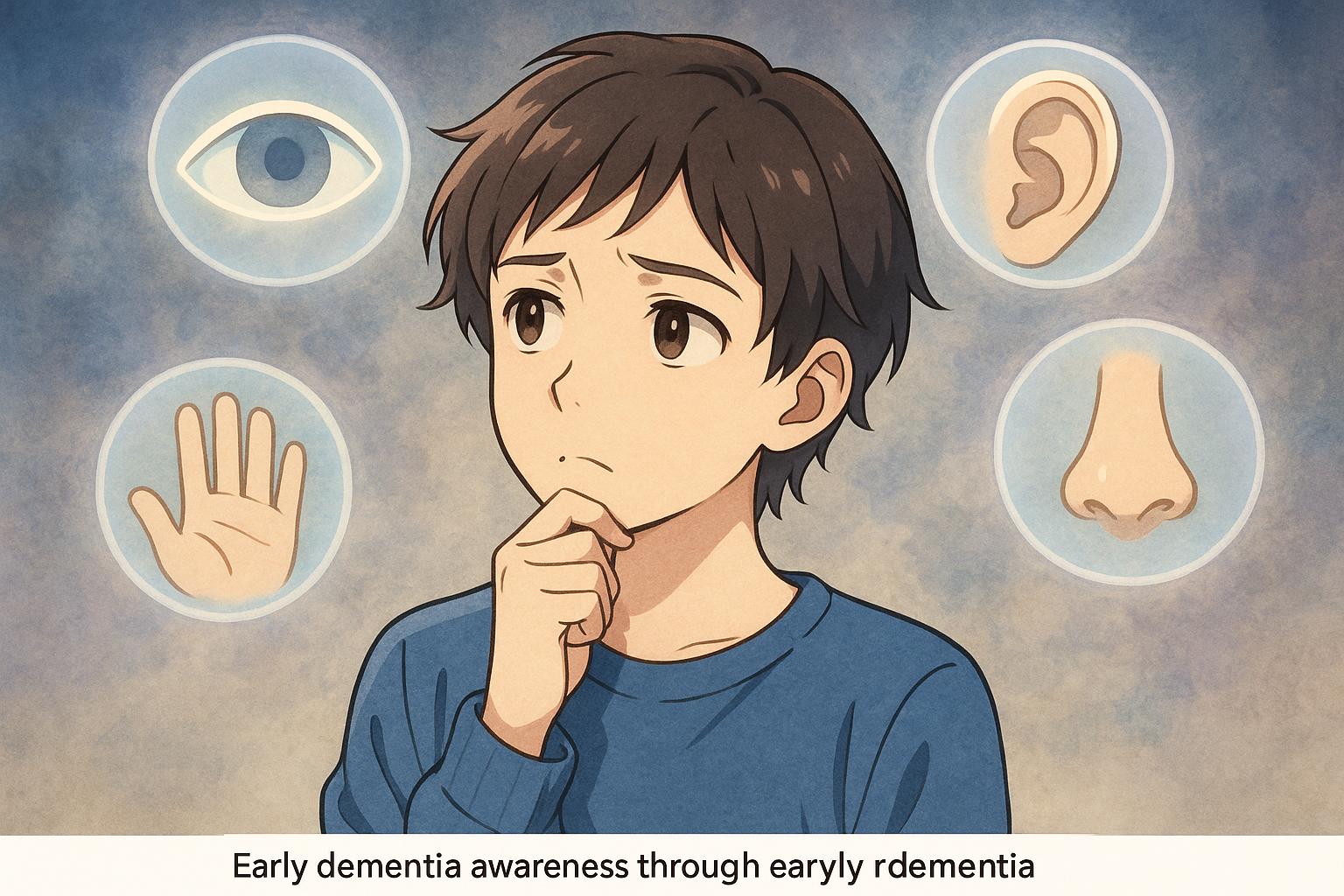New research highlights alterations in sight, hearing, taste, touch, and balance as critical early indicators of dementia, challenging the traditional memory-focused approach and opening doors to earlier intervention and improved care.
Changes in sensory perception, such as alterations in sight, hearing, taste, touch, and balance, have emerged as critical early warning signs of dementia, contradicting the traditional focus on memory-related symptoms. Experts caution that these sensory changes can occur years before individuals display well-known dementia signs, providing an essential window for early diagnosis and intervention.
Dementia severely affects millions globally, presenting severe challenges not only to patients but also to families and caregivers. Traditionally, diagnostic assessments have focused heavily on cognitive aspects, such as memory tests and verbal interactions. However, a growing body of research indicates that sensory impairments often precede memory issues, with some studies suggesting that symptoms like changes in vision and hearing can signal the onset of dementia, particularly Alzheimer’s disease, far earlier than previously considered.
Professor Andrea Tales from Swansea University, along with Dr Emma Richards from Public Health Wales and Professor Jan Kremláček from Charles University, advocates for broadening diagnostic criteria to include sensory changes, suggesting that this could allow for the identification of dementia at a preclinical stage. “Broadening the diagnostic approach beyond memory testing raised the potential to identify dementia at preclinical stages when therapies and life modifications may be most effective,” Kremláček elaborated.
Sensory signs of dementia can often be mistaken for normal ageing processes. Commonly overlooked symptoms include heightened sensitivity to noise, coordination difficulties, and even a decreased sense of smell, all of which can lead to confusion and distress for patients. A decline in the ability to identify familiar objects through touch can also surface in initial stages, signalling a cognitive decline that merits further investigation.
Recent analyses have highlighted that more than 944,000 individuals in the UK live with dementia, while in the United States, this figure reaches approximately seven million. Alarmingly, as the global population continues to age, the economic burden of dementia care is poised to rise sharply. Recent estimates suggest that the annual cost of dementia care in the UK alone stands at £42 billion, with projections indicating that this figure could jump to £90 billion within 15 years.
Molly Murray, an expert in young-onset dementia from the University of West Scotland, underlines the importance of recognising early symptoms, noting that coordination and vision-related issues often appear first in younger patients diagnosed with dementia. Indeed, one-third of individuals with young-onset Alzheimer’s report that their initial symptoms involved visual disturbances.
Moreover, research has shown that sensory deficits significantly correlate with increased risks of developing cognitive disorders over time. A recent review underscored that cumulative sensory impairments—including declines in vision, hearing, and olfaction—are linked to brain atrophy, further advocating for comprehensive sensory assessments in dementia management.
In light of these findings, healthcare professionals are encouraged to remain vigilant for sensory changes, as doing so can facilitate timely medical intervention. Understanding these nuances in patients’ sensory perceptions is crucial for offering the necessary emotional and social support, particularly during a time that could be both confusing and distressing for them.
As ongoing research continues to elucidate the relationship between sensory changes and dementia, the prospect of early diagnosis looms larger than ever. By refining diagnostic criteria to encompass these often-overlooked symptoms, the medical community hopes to improve early detection and create pathways for more effective management of dementia, ultimately enhancing the quality of life for those affected.
 Reference Map:
Reference Map:
- Paragraph 1 – [1], [4]
- Paragraph 2 – [1], [2], [5]
- Paragraph 3 – [2], [3], [6]
- Paragraph 4 – [1], [6]
- Paragraph 5 – [1], [4]
Source: Noah Wire Services
- https://www.dailymail.co.uk/health/article-14798359/signs-dementia-memory-sensory-changes.html?ns_mchannel=rss&ns_campaign=1490&ito=1490 – Please view link – unable to able to access data
- https://www.medical-news.org/early-warning-signs-of-alzheimers-disease-that-are-easy-to-miss/66900/ – This article discusses subtle early warning signs of Alzheimer’s disease that are often overlooked. It highlights sensory difficulties such as trouble identifying common objects by touch, declining attention to personal grooming, reduced sense of direction, and increased sensitivity to noise or crowds. These signs can precede more obvious symptoms and may be indicative of cognitive decline. The piece emphasizes the importance of recognising these early indicators to seek timely medical attention and intervention.
- https://pmc.ncbi.nlm.nih.gov/articles/PMC10928952/ – This scientific review examines the link between sensory loss and the risk of developing dementia. It presents evidence that impairments in olfaction, vision, and hearing are associated with an increased risk of dementia. The article explores potential neurobiological mechanisms underlying this relationship and suggests that sensory deficits could serve as early indicators for neurodegenerative diseases, highlighting the need for further research in this area.
- https://elearncollege.com/social-care-and-health/dementia-warning-signs-beyond-memory-loss/ – This article explores dementia warning signs beyond memory loss, focusing on sensory changes. It discusses how olfactory loss can be an early precursor to Alzheimer’s disease and dementia with Lewy bodies. The piece highlights the impact of sensory changes on daily life and social interactions, emphasizing the importance of recognising these subtle changes for early intervention and support.
- https://blog.highgateseniorliving.com/how-dementia-affects-the-5-senses-and-what-you-can-do-to-help – This blog post details how dementia affects the five senses—hearing, vision, smell, taste, and touch. It explains that dementia can impair the brain’s ability to process sensory information, leading to challenges in interpreting sounds, sights, and other sensory inputs. The article offers practical tips for caregivers to assist individuals with dementia, such as maintaining a calm environment, using contrasting colours, and ensuring safety measures are in place to accommodate sensory changes.
- https://pmc.ncbi.nlm.nih.gov/articles/PMC11616278/ – This research article investigates the association between aging-related sensory decline and Alzheimer’s disease. It presents evidence that cumulative sensory deficits, including impairments in vision, hearing, smell, and touch, are linked to increased brain atrophy and cognitive decline. The study underscores the significance of multisensory impairments as risk factors for Alzheimer’s and advocates for comprehensive sensory assessments in managing the disease.
- https://www.bellagroves.com/dementia-sensory-changes/ – This article discusses how dementia can lead to changes in sensory perception, including vision, hearing, touch, taste, and smell. It explains that individuals with dementia may experience difficulties in interpreting sensory information, leading to confusion and disorientation. The piece offers practical advice for caregivers, such as ensuring clear labelling of hot and cold taps, maintaining a calm environment to reduce auditory confusion, and providing comforting touch to support individuals with dementia.













